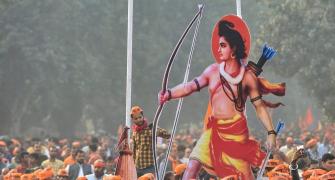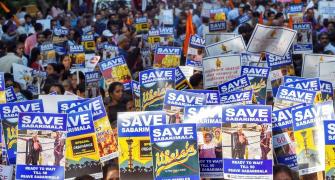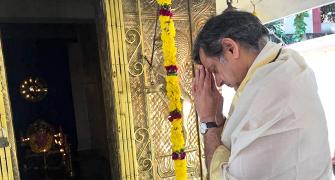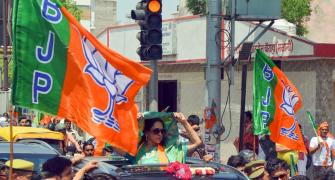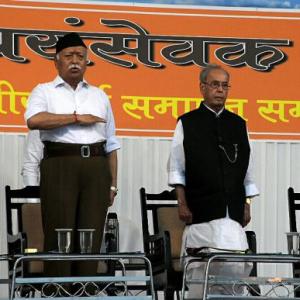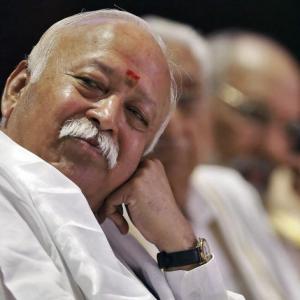'The idea of Hindu Rashtra is one of the most inclusive concepts.'
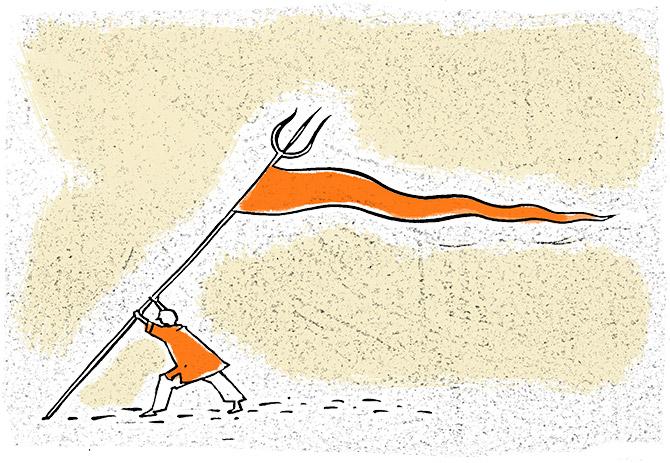
A Rashtriya Swayamsevak Sangh pracharak's book The RSS: Roadmaps For the 21st Century is creating a buzz because it is likely to explain the organisation's views on some of the most contentious issues the country is grappling with just two decades into the 21st century.
"For the RSS, the present-day guiding principle is our Constitution," Sunil Ambekar, author of The RSS: Roadmaps For the 21st Century tells Prasanna D Zore/Rediff.com. The first part of an ongoing conversation.
How did you convince RSS office bearers to support an idea that allows an RSS pracharak to come out with a book that articulates the RSS's views, its roadmap for the 21st century?
I did not have to convince RSS office-bearers for writing this book. In fact, many books have been written on the Sangh. (The late RSS ideologue and Sarkaryavah/general secretary) (H V) Seshadriji himself has written a book on the Sangh (RSS: A Vision in Action); (Dattopant Bapurao) Thengdiji (another RSS ideologue and stalwart) has also written a book.
All our senior office-bearers guide us through their speeches and writing from time to time. The publisher (Rupa) approached me to write a book on this issue.
When I discussed this idea with Sangh's adhikaris (office bearers), they said why not. We always go to society with our ideas and programmes and this book is also part of our outreach programme.
What kind of feedback, difference of opinions emerge when you gave the book's manuscript for the approval to RSS ideologues? Is the book a product of the meetings, discussions among all the opinion makers in the RSS that you must have been privy to as a swayamsewak?
I have written this book from what I have understood about the Sangh through my journey as a swaymsevak. The book is all about the Sangh's working in different spheres of society.
I have shared my ideas with the Sangh's adhikaris; they were appreciative about my experiences as swaymsevak. Although there were suggestions about more extensive experiences on certain aspects.

How does the RSS look at the caste system in the 21st century? Does the RSS's roadmap for eradication of the caste system in India reject the caste system prescribed in the Manusmriti and perpetrated perpetually by the Brahminic social order that Manuvaad helped create in the first place?
For the RSS, the present-day guiding principle is our Constitution.
We believe that our society is dynamic; everything can be reviewed by the present generation.
Every book and texts are open for interpretation. Society needs to rationalise custom according to present society.
The Constitution is one of the most modern and rational documents. The Sangh believes it is very important to bring Samarasta (harmony) in society. The Sangh is trying to find a solution through Samrasta.
What is the RSS's idea of Hindu Rashtra? What role would women, the LGBTQ community, caste and religion, especially Muslims, play in a Hindu Rashtra espoused by the RSS?
Hindutva is a way of life through which we find oneness in society. The idea of Hindu Rashtra is one of the most inclusive concepts.
In Hindutva, there is no scope for discrimination on the basis of birth, faith, way of worship or anything else. Everyone who lives here are Hindus.
Hindu-ness espouses civilisational values which all individuals who live in this country carry. The belief system may be different, but basic concepts are the same.
When I say Hindu-ness belongs to all, I do not need to call the name of each category. Hindu-ness is for all, and, by all. This land belongs to people who live here and have adopted its civilisational values.
We have our history which teaches us Ahimsa, Samrasta and Sambhav (equality). These values have expanded in the entire world.
Does your book speak about the movements to build temples at places where mosques -- where Hindus think temples existed once -- currently stand?
Hindutva is all about harmony and peace. It is not about reaction or replacement. Our civilisation values are constructive.
We believe in the Constitutional mechanism and that's why whole of India is eagerly awaiting the judgment on the Ram temple.
We do not believe in reaction.
Ramjanambhoomi is the birth place of Ram; this is the belief of crores of Indians. The people want to build the Ram temple at the birthplace of God Ram. So whatever decision will be taken, it will be taken under the Constitutional framework.
You have emphatically stated that the RSS as a cultural organisation believes in 'consensus and doesn't believe in making laws for the society through judicial interventions'.
Would the RSS then support the revocation of Article 370 in of Jammu and Kashmir, the criminalisation of triple talaq, the implementation of the NRC, as this government seems to be using its strength in the Lok Sabha to bulldoze the opposition and implement the issues mentioned in its manifesto? The emphasis here is on lack of legislative and political consensus.
We support removal of triple talaq which gives equal rights to Muslim women. I have written on this issue in this book too. All the changes have been brought because people wanted them.
We also support the revocation of Article 370 which gives equal rights to women, tribals, Dalits and fair treatment to people of Ladakh.
The Lok Sabha is the people's parliament; if a bill has been passed in the Lok Sabha it means the representatives of 1.3 billion people have supported it. Both bills have been passed in both Houses. These decisions have been taken by will of the people.
It is not bulldozing the Opposition, but respecting the people's mandate. We have adopted this parliamentarian system where we follow majoritarian democracy. This system is a tested system. I do not think that currently, we have any system which can replace it.

Where does the RSS stand on the issue of Aryan Invasion Theory? Scientific material is being produced by those who support and oppose the theory that the Aryans invaded India from Europe and hence should be treated as foreigners or otherwise. Should these issues be discussed in 21st century India?
Aryan invasion theory is old propaganda which has been spread by a small group. The new study has explained that Aryan Invasion was a myth. It has been proved in many studies.
Recently, some findings of Rakhigarhi has proved the same thing. Babasaheb Ambedkar himself rejected this theory. The theory has been manufactured by the colonial ruler to divide people; we are carrying their propaganda without understanding the truth.
Yes, it is necessary to discuss (the issue) in the 21st century to make an inclusive society. These theories still play a role in dividing people. Our next generation must be aware of these dividing propagandas.
The RSS has always been an enigma for most Indians. There were times when it had steadfastly kept away from hoisting the national flag at its headquarters in Nagpur and shakhas, but today has no issues with doing so; the same applies to accepting the Constitution that calls India a Secular Socialist Democracy? What brought about this change in the RSS?
This kind of rumours has been spread with mala fide intention. The Sangh has hoisted flag at all its shakhas when Gandhiji was in jail before 1947.
Every swaymsevak and all office bearers participate in flag hoisting programmes in their respective areas where they stay or are doing pravas (travelling). They are doing the same since Independence.
Some years ago, only some government organisations had the right to hoist the flag. After the Supreme Court judgment, any individual/group can hoist the flag. The Sangh is part of society; it follows and respects all the national symbols.
The word 'secular' and 'socialist' were inserted in 1976 by some political groups with some agenda. It was not part of our Constitution.
Our forefathers believed that we Indians are naturally secular. This word is for those who are intolerant of others faiths. This is a land where people practise hundreds of faiths from thousands of years.
The RSS has equally steadfastly believed in Swadeshi economics compared to following the diktats from the Washington Consensus. The recent Taxation Laws (Amendment) Ordinance promulgated by President Ram Nath Kovind that will make way for cutting corporate income tax sharply is straight out of the Washington Consensus textbook.
How does the RSS respond to such acceptance of free market economic policy prescriptions?
Does the RSS think such blind emulation can help revive the economy or benefits the masses?
The Sangh does not believe either in blind following or blind opposing of any thoughts. We are against all such policies which can adversely affect our farmers and merchants, but we also don't support the policies of Socialism and Communism which blindly opposes market economics.
We need to make the market economics more humanitarian so we can help the poor.

